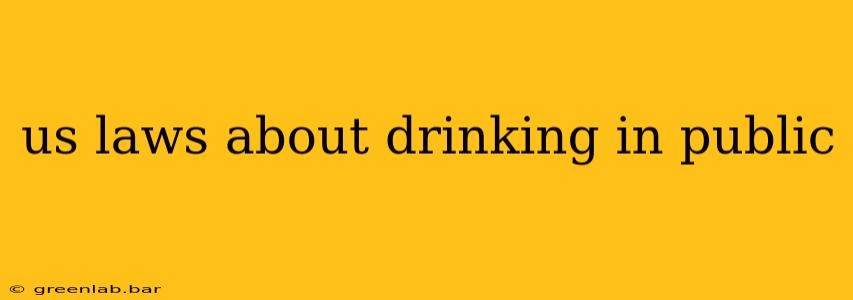Navigating the complex landscape of US public drinking laws can be tricky. Unlike many countries with uniform national regulations, the United States adopts a decentralized approach, leaving much of the legislative power to individual states and municipalities. This means that the legality of consuming alcohol in public varies significantly depending on your location. This guide provides a general overview, but it's crucial to check the specific laws of your city, county, and state before consuming alcohol in public spaces.
The General Picture: Open Container Laws
The most common public drinking regulation across the US is the open container law. These laws prohibit possessing open alcoholic beverages in public places, regardless of whether you're actively drinking. Even having an unopened bottle in your car can result in a citation in many jurisdictions. The penalties for violating open container laws range from small fines to more substantial penalties, including arrest.
However, there are often exceptions. Many states and municipalities allow open containers in designated areas, such as:
- Designated outdoor refreshment areas (DORAs): These are specific zones where local governments allow open alcohol consumption, often in conjunction with restaurants and bars.
- Parks and beaches with permits: Some locations might permit alcohol consumption with the proper permits or during specific events.
- Private property: Generally, open container laws do not apply to private property where the owner permits alcohol consumption.
Variations Across States: A Complex Landscape
Due to the decentralized nature of alcohol regulation, summarizing all 50 states' laws comprehensively is impossible within this scope. However, we can highlight some key variations and considerations:
States with Relatively Lenient Laws (Often with Specific Restrictions):
While no state completely permits unrestricted public drinking, some states have less stringent regulations or more exceptions than others. This often involves specific designations for outdoor areas or events. However, even in these states, it's essential to verify local ordinances.
States with Stricter Laws:
Conversely, many states enforce strict open container laws with significant penalties. These laws often extend beyond simply drinking in public to encompass possessing open containers in vehicles, even if the vehicle is parked.
Municipal Ordinances: The Local Angle
It's vital to remember that city and county ordinances can be far stricter than state laws. A city might prohibit alcohol consumption in public parks, even if state law allows it under certain circumstances. Always research local laws before consuming alcohol in public areas.
Consequences of Violating Public Drinking Laws
The penalties for violating public drinking laws vary widely, depending on the location and the circumstances. Potential consequences can include:
- Fines: These can range from a few hundred dollars to much higher amounts depending on the severity of the offense and the jurisdiction.
- Arrest: Depending on the jurisdiction and any accompanying offenses, arrest is a possibility.
- Community service: Some jurisdictions might impose community service as a penalty.
- License suspension or revocation: In some cases, violating public drinking laws, especially if driving is involved, can lead to the suspension or revocation of a driver's license.
Finding Specific Information: Your Best Resources
For accurate, up-to-date information on public drinking laws in your area, consult these resources:
- Your state's Alcoholic Beverage Control (ABC) website: These websites usually contain detailed information on state alcohol laws.
- Your city or county government website: Local ordinances will be found here.
- A legal professional: If you have specific questions or concerns, consulting an attorney specializing in alcohol law is always recommended.
Disclaimer: This article provides general information and should not be considered legal advice. Always consult official sources and legal professionals for accurate and up-to-date information relevant to your specific situation.

